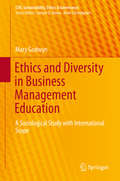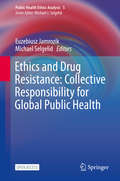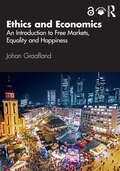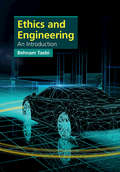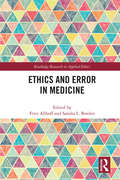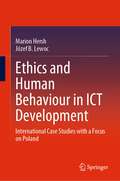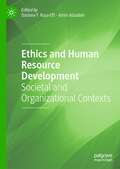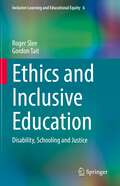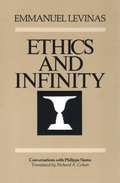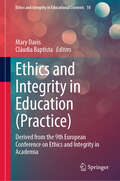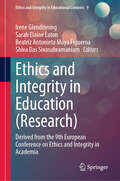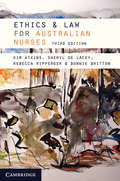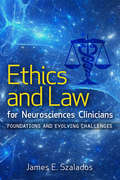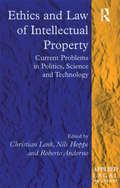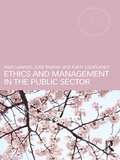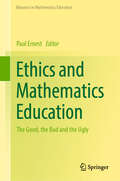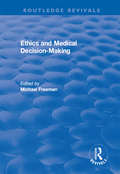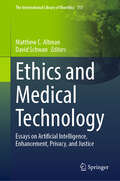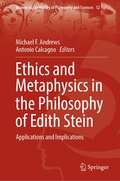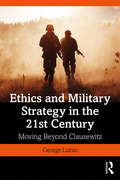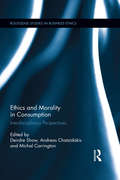- Table View
- List View
Ethics and Diversity in Business Management Education
by Mary GodwynThis book examines business education from the perspective of the social sciences and humanities, specifically sociology and ethics. In particular, it offers the rare combination of liberal arts and business management education which is used to investigate how aspects of business education might be responsible for and connected to the distribution of wealth that currently dominates the global economy. Through interviews with business ethics faculty members, students, and graduates around the world, as well as attendance in business ethics classes and examination of classroom materials, the author presents patterns of theory, perspectives and outcomes from culturally and geographically diverse business schools. This research provides insights into how business ethics educators are responding to the growing diversity in student populations and the dual crises of environmental destruction and lack of ethical stewardship. The book also discusses alternative discourses within business schools and makes recommendations for future improvements.
Ethics and Drug Resistance: Collective Responsibility for Global Public Health (Public Health Ethics Analysis #5)
by Euzebiusz Jamrozik Michael SelgelidThis Open Access volume provides in-depth analysis of the wide range of ethical issues associated with drug-resistant infectious diseases. Antimicrobial resistance (AMR) is widely recognized to be one of the greatest threats to global public health in coming decades; and it has thus become a major topic of discussion among leading bioethicists and scholars from related disciplines including economics, epidemiology, law, and political theory. Topics covered in this volume include responsible use of antimicrobials; control of multi-resistant hospital-acquired infections; privacy and data collection; antibiotic use in childhood and at the end of life; agricultural and veterinary sources of resistance; resistant HIV, tuberculosis, and malaria; mandatory treatment; and trade-offs between current and future generations. As the first book focused on ethical issues associated with drug resistance, it makes a timely contribution to debates regarding practice and policy that are of crucial importance to global public health in the 21st century.
Ethics and Economics: An Introduction to Free Markets, Equality and Happiness
by Johan GraaflandThis textbook applies economic ethics to evaluate the free market system and enables students to examine the impact of free markets using the three main ethical approaches: utilitarianism, principle-based ethics and virtue ethics. Ethics and Economics systematically links empirical research to these ethical questions, with a focus on the core topics of happiness, inequality and virtues. Each chapter offers a recommended further reading list. The final chapter provides a practical method for applying the different ethical approaches to morally evaluate an economic policy proposal and an example of the methodology being applied to a real-life policy. This book will give students a clear theoretical and methodological toolkit for analyzing the ethics of market policies, making it a valuable resource for courses on economic ethics and economic philosophy.
Ethics and Economics: An Introduction to Free Markets, Equality and Happiness
by Johan GraaflandThis textbook applies economic ethics to evaluate the free market system and enables students to examine the impact of free markets using the three main ethical approaches: utilitarianism, principle-based ethics and virtue ethics.Ethics and Economics systematically links empirical research to these ethical questions, with a focus on the core topics of happiness, inequality and virtues. Each chapter offers a recommended further reading list. The final chapter provides a practical method for applying the different ethical approaches to morally evaluate an economic policy proposal and an example of the methodology being applied to a real-life policy.This book will give students a clear theoretical and methodological toolkit for analyzing the ethics of market policies, making it a valuable resource for courses on economic ethics and economic philosophy.The Open Access version of this book, available at http://www.taylorfrancis.com, has been made available under a Creative Commons Attribution-Non-Commercial (CC-BY-NC) 4.0 license.
Ethics and Engineering: An Introduction (Cambridge Applied Ethics)
by Behnam TaebiThe world population is growing, yet we continue to pursue higher levels of well-being, and as a result, increasing energy demands and the destructive effects of climate change are just two of many major threats that we face. Engineers play an indispensable role in addressing these challenges, and whether they recognize it or not, in doing so they will inevitably encounter a whole range of ethical choices and dilemmas. This book examines and explains the ethical issues in engineering, showing how they affect assessment, design, sustainability, and globalization, and explores many recent examples including the Fukushima Daiichi nuclear disaster, Dieselgate, 'naked scanners' at airports, and biofuel production. Detailed but accessible, the book will enable advanced engineering students and professional engineers to better identify and address the ethical problems in their practice.
Ethics and Error in Medicine (Routledge Research in Applied Ethics)
by Fritz Allhoff Sandra L. BordenThis book is a collection of original, interdisciplinary essays on the topic of medical error. Given the complexities of understanding, preventing, and responding to medical error in ethically responsible ways, the scope of the book is fairly broad. The contributors include top scholars and practitioners working in bioethics, communication, law, medicine and philosophy. Their contributions examine preventable causes of medical error, disproportionate impacts of errors on vulnerable populations, disclosure and apology after discovering medical errors, and ethical issues arising in specific medical contexts, such as radiation oncology, psychopathy, and palliative care. They also offer practical recommendations for respecting autonomy, distributing burdens and benefits justly, and minimizing injury to patients and other stakeholders. Ethics and Error in Medicine will be of interest to a wide range of researchers, students, and practitioners in bioethics, philosophy, communication studies, law, and medicine who are interested in the ethics of medical error.
Ethics and Finance
by John HendryEthics and Finance: An Introduction provides a comprehensive and accessible introduction to the ethical issues raised by modern finance. Drawing carefully on ethical theory and with frequent use of case studies, it includes an analysis of the global financial system and its regulation and control, as well as a detailed analysis of the financial crisis. Chapters on specific areas of finance practice cover all the major financial scandals of recent times, from mis-selling to market manipulation and from insider trading to bankers' bonuses, as well as much more positive developments. From micro finance to derivatives trading, the book provides a careful and balanced treatment designed to help finance students and practitioners approach this sensitive topic in a thoughtful and constructive way. No prior knowledge of ethics or finance is required, and the book will be invaluable to students, finance teachers, practitioners and regulators.
Ethics and Human Behaviour in ICT Development: International Case Studies with a Focus on Poland
by Marion Hersh Józef B. LewocEthics and Human Behaviour in ICT Development discusses ethics in a professional context and encourages readers to self-assessment of their own behaviour. It provides thought-provoking accounts of the little-known early history of technological development in information and communication technology (ICT) and the automation industry in Poland, with a focus on Wroclaw. The book provides a framework for understanding the relationship between ethics and behaviour, and analyses critically ethical and behavioural issues in challenging workplaces and social contexts. It includes:case studies from around the world, especially Poland, which illustrate the relationships between human behaviour and ethics;biographies of successful Polish ICT and automation leading designers;analysis of case studies of human behaviour and ethics in challenging industrial development and other environments; andillustrative practical applications alongside the theory of human behaviour and ethics. The authors demonstrate the ingenuity of the early Polish designers, programmers and other specialists in overcoming the shortage of components caused by import embargoes to enable Poland to develop its own computer industry. An example of this is Elwro, formerly the largest manufacturer of computers in Poland. The discussion of its growth illustrates the potential of human creativity to overcome problems. The discussion of its fall highlights the importance of ethical approaches to technology transfer and the dangers of a colonialist mentality. The book is designed for engineers, computer scientists, researchers and professionals alike, as well as being of interest for those broadly concerned with ethics and human behaviour.
Ethics and Human Resource Development: Societal and Organizational Contexts
by Darlene F. Russ-Eft Amin AlizadehThis book adds to the debate around HRD and ethical dimensions in the workplace, evaluating the micro and macro environments and their role in designing a moral organizational culture. It assesses contemporary issues such as CSR and DEI and culture and their impact on the organization and employees. Examining the definition, purpose, and scope of ethics applied in HRD, this book will offer readers an in-depth understanding of current and future ethical challenges in the workplace and in society. It will provide theoretical and practical knowledge for creating and sustaining ethical climates in organizations.
Ethics and Inclusive Education: Disability, Schooling and Justice (Inclusive Learning and Educational Equity #6)
by Gordon Tait Roger SleeThis book reveals the entanglement of ethics, rights and justice in education. It aims to develop everyday philosophy to guide choices as we continue to attempt to make schools places for all comers. The authors offer education as a social good, a building block for inclusive communities. This assumes an ethical predisposition. Ethics and inclusive education takes the reader on a journey through the conceptual foundations of ethics, rights and justice to assist us to build a formulation of the fair or just society and the way ethical approaches to schooling may support or unravel that.
Ethics and Infinity
by Emmanuel LevinasLevinas brings together the phenomenology of Husserl, the fundamental ontology of Heidegger, and the Bible. This book highlights his modesty and reserve and, above all, his rigor. It is the best introduction to his work. Chapters Include: Bible and Philosophy; Heidegger; The 'There Is'; The Solitude of Being; Love and Filiation; Secrecy and Freedom; Responsibility for the Other; The Glory of Testimony; The Hardness of Philosophy and the Consolations of Religion. Translated from the French by Richard Cohen.
Ethics and Integrity in British Politics
by Nicholas Allen Sarah BirchPublic perceptions of political ethics are at the heart of current political debate. Drawing on original data, this book is the first general account of popular understandings of political ethics in contemporary British politics. It offers new insights into how citizens understand political ethics and integrity and how they form judgments of their leaders. By locating these insights against the backdrop of contemporary British political ethics, the book shows how current institutional preoccupations with standards of conduct all too often miss the mark. While the use of official resources is the primary focus of much regulation, politicians' consistency, frankness and sincerity, which citizens tend to see in terms of right and wrong, are treated as 'normal politics'. The authors suggest that new approaches may need to be adopted if public confidence in politicians' integrity is to be restored.
Ethics and Integrity in Education: Derived from the 9th European Conference on Ethics and Integrity in Academia (Ethics and Integrity in Educational Contexts #10)
by Mary Davis Cláudia BaptistaThis book offers a collection of effective and insightful practices in academic integrity through diverse perspectives and global contexts. Contributors ranging from faculty, academic integrity leads, academic conduct officers, student support staff, independent researchers and students in nine different countries share their collective knowledge and understanding based on their roles, work and study in academic integrity. The main themes of the chapters focus on innovation and collaboration, community and culture, stakeholders in academic integrity and awareness of breaches and ethics. Within these themes, the contributors explore Artificial Intelligence tools, inclusion, collaboration with students, networks, publishing, setting up research offices, student champions at high school and university, and academic conduct breaches. The chapters end with calls to action and recommendations for readers to incorporate into their practice. In these ways, the book aims to raise awareness of important issues in academic integrity contexts and support the continued development of practice.
Ethics and Integrity in Education: Derived from the 9th European Conference on Ethics and Integrity in Academia (Ethics and Integrity in Educational Contexts #9)
by Sarah Elaine Eaton Irene Glendinning Beatriz Antoneita Moya Figueroa Shiva Das SivasubramaniamThis book provides insights on approaches for enhancing ethical practice, professionalism and integrity for future development in academia and beyond. It does so by offering a thorough review of the background and processes to enhance academic integrity in the years of artificial intelligence. The book also explores the future of research integrity and ethics by examining lessons from the past. Ideas from research findings on how to incorporate an integrity culture in continuously changing secondary and higher education are addressed. The chapters are written by international authors who have been working in the fields of integrity sciences, focussing on ways to enhance ethics and integrity amongst students, academics and institutions (including schools). They identify approaches to deter and detect misconduct and discuss the ways to educate academic integrity amongst academic communities. The book addresses best practices from international institutions and how these can be transformed and adopted in different subject areas. Embracing and managing the use of generative artificial intelligence (GenAI) tools in education are key themes throughout. Special attention is given to the ethical use of GenAI, exploring the ways to minimise the misuses via policies and guidelines.
Ethics and Law
by W. Bradley WendelThis casebook provides an overview of the wide range of legal and ethical issues facing lawyers in practice. As did prior editions, the Fifth Edition integrates discussion of the ABA's Model Rules, the ALI's Restatement of the Law Governing Lawyers, as well as case law, statutory law, and regulatory law governing lawyers. Many sections of the book are expanded and updated, including discovery abuse, ethics in electronic discovery, advertising and the Internet, simultaneous representation of corporations and officers, prosecutorial misconduct, and legal advising by government lawyers.
Ethics and Law for Australian Nurses
by Kim Atkins Bonnie Britton De Lacey Sheryl Rebecca RippergerThe third edition of Ethics and Law for Australian Nurses develops an innovative practical framework for understanding the ethical and legal dimensions of nursing practice in Australia. Taking a 'relational' approach to practice, the text foregrounds the concepts of personhood, vulnerability and the nurse-patient relationship as the source of a nurse's moral and legal obligations. This approach is central to the book's discussion of key ethical and legal concepts throughout the text including consent and autonomy, negligence and liability, confidentiality and trust, and culturally safe practice. This edition has been thoroughly revised to include the latest research and methods, updated legislation and links to professional documentation, along with a new chapter on aged care. Student learning is supported by case studies, legal case extracts and learning exercises. A new instructor companion website features a curated suite of multimedia resources and extension questions.
Ethics and Law for Neurosciences Clinicians: Foundations and Evolving Challenges (Clinical Neurology Best Practices)
by James E SzaladosThe brain represents the final frontier in medical sciences. Clinical neurosciences include the subspecialties of neurology, neurosurgery, neuro-imaging, cerebrovascular interventional specialties, neurocritical care, and the allied specialties in pharmacy and nursing. The first lens through which we see our patients is the clinical perspective; however, the complexity of neurosciences and the rapidity of the advances in these subspecialties require that clinicians not lose sight of the personhood of the patients, the professionalism required in the care of these complex patients, or the regulatory environment in which we practice. Science and technology are advancing more rapidly than regulations or the law can interpret and integrate them into a supportive or regulatory framework. Thus, morality, ethics, and the law comprise the final lens through which we approach complex patient management issues, frame our communications with patients and families, and evaluate the risks and potential benefits of new technology. Ethics and Law for Neurosciences Clinicians is written for all clinicians in the neurosciences specialties to examine and re-examine the ethical and legal implications of advances in clinical neurosciences.
Ethics and Law of Intellectual Property: Current Problems in Politics, Science and Technology (Applied Legal Philosophy)
by Nils Hoppe Christian LenkDivided into three parts, this edited volume gives an overview of current topics in law and ethics in relation to intellectual property. It addresses practical issues encountered in everyday situations in politics, research and innovation, as well as some of the underlying theoretical concepts. In addition, it provides an insight into the process of international policy-making, showing the current problems in the area of intellectual property in science and research. It also highlights changes in the fundamental understanding of common and private property and the possible implications and challenges for society and politics.
Ethics and Management in the Public Sector (Masters in Public Management)
by Alan Lawton Julie Rayner Karin LasthuizenGrappling with ethical issues is a daily challenge for those working in organizations that deliver public services. Such services are delivered through an often bewildering range of agencies and amidst this constant change, there are fears that a public service ethos, a tradition of working in the public interest, becomes blurred. Using extensive vignettes and case studies, Ethics and Management in the Public Sector illuminates the practical decisions made by public officials. The book takes a universal approach to ethics reflecting the world-wide impact of public service reforms and also includes discussions on how these reforms impact traditional vales and principles of public services. This easy-to-use textbook is a definitive guide for postgraduate students of public sector ethics, as well as students of public management and administration more generally.
Ethics and Mathematics Education: The Good, the Bad and the Ugly (Advances in Mathematics Education)
by Paul ErnestThis edited volume is an inquiry into the ethics of mathematics education, and to a lesser extent, the ethics of mathematics. The imposition of mathematics for all raises questions of ethics. What are the ethics of teaching school mathematics? What are the costs as well as the benefits? What are the ethical issues raised by the official aims of mathematics teaching, the planned curriculum, the pedagogies employed in school and college mathematics and the assessment systems? These questions are addressed in the book as well as what systems of ethics we might use. The volume ventures into a burgeoning new field. It offers a unique set of investigations, both theoretical and in terms of practices. It announces the ethics of mathematics education as a new subfield of research and includes valuable contributions from many of the best-known researchers in mathematics education; additionally, it is a valuable resource for students, teachers and researchers in the field. This is an enduring and classic source book in the field. From the wisdom of leading scholars to the little heard voices of students, this collection offers the reader many striking new insights into the ethics of mathematics and education.
Ethics and Medical Decision-Making (Routledge Revivals)
by Michael D. FreemanThis title was first published in 2001: Ethical thinking about medical decision-making has roots deep in history. This collection of contemporary essays by leading international scholars traces the development of modern bioethics and explores the theory and current issues surrounding this widely contested field.
Ethics and Medical Technology: Essays on Artificial Intelligence, Enhancement, Privacy, and Justice (The International Library of Bioethics #113)
by Matthew C. Altman David SchwanThis book provides a comprehensive survey of ethical issues raised by advanced medicaltechnologies. The field&’s leading authorities explore how artificial intelligence, telehealth,robot caregivers, genetic therapies and enhancement, stem cell research,neurotechnology, electronic health records, data collection, and digital nudging arereshaping the landscape of medical practice. Organized around core ethical themes, thechapters consider how new and emerging technologies transform personal identity, the provider-patient relationship, privacy and autonomy, and social equity. Contributors clarifythe complex values involved in medical innovation and practice, and explore what is atstake in the current ethical debates around these issues. While offering a valuableintroduction for advanced students, professional philosophers, medical ethicists, andpolicymakers, this book also advances the scholarly discussion by presenting originaltheses and arguments, making it essential reading for specialists.
Ethics and Metaphysics in the Philosophy of Edith Stein: Applications and Implications (Women in the History of Philosophy and Sciences #12)
by Antonio Calcagno Michael F. AndrewsThis book is dedicated to Edith Stein (1891–1942), who is known widely for her contributions to metaphysics. Though she never produced a dedicated work on questions of ethics, her corpus is replete with pertinent reflections. This book is the first major scholarly volume dedicated to exploring Stein’s ethical thought, not only for its wide-ranging content, from her earlier to later works, but also for its applications to such fields as psychology, theology, education, politics, law, and culture. Leading international scholars come together to provide a systematic account of Stein’s ethics, highlighting its relation to Stein’s highly developed and complex metaphysics. Questions about the good, evil, the rights and ethical comportment of the person, the state, and feminism are addressed. The book appeals to scholars interested in the history of philosophical and ethical thought
Ethics and Military Strategy in the 21st Century: Moving Beyond Clausewitz (War, Conflict and Ethics)
by George R. Lucas, Jr.This book examines the importance of "military ethics" in the formulation and conduct of contemporary military strategy. Clausewitz’s original analysis of war relegated ethics to the side-lines in favor of political realism, interpreting the proper use of military power solely to further the political goals of the state, whatever those may be. This book demonstrates how such single-minded focus no longer suffices to secure the interest of states, for whom the nature of warfare has evolved to favor strategies that hold combatants themselves to the highest moral and professional standards in their conduct of hostilities. Waging war has thus been transformed in a manner that moves beyond Clausewitz’s original conception, rendering political success wholly dependent upon the cultivation and exercise of discerning moral judgment by strategists and combatants in the field. This book utilizes a number of perspectives and case studies to demonstrate how ethics now plays a central role in strategy in modern armed conflict. This book will be of much interest to students of just war, ethics, military strategy, and international relations.
Ethics and Morality in Consumption: Interdisciplinary Perspectives (Routledge Studies in Business Ethics #8)
by Deirdre Shaw Andreas Chatzidakis Michal CarringtonEthical consumerism is on the rise. No longer bound to the counter-cultural fringes, ethical concerns and practices are reaching into the mainstream of society and being adopted by everyday consumers – from considering carbon miles to purchasing free-range eggs to making renewable energy choices. The wide reach and magnitude of ethical issues in society across individual and collective consumption has given rise to a series of important questions that are inspiring scholars from a range of disciplinary areas. These differing disciplinary lenses, however, tend to be contained in separate streams of research literature that are developing in parallel and in relative isolation. Ethics in Morality and Consumption takes an interdisciplinary perspective to provide multiple vantage points in creating a more holistic and integrated view of ethics in consumption. In this sense, interdisciplinary presupposes the consideration of multiple and distinct disciplines, which in this book are considered in delineated chapters. In addition, the Editors make an editorial contribution in the final chapter of the book by combining these separate disciplinary perspectives to develop a nascent interdisciplinary perspective that integrates these perspectives and presents platforms for further research.
